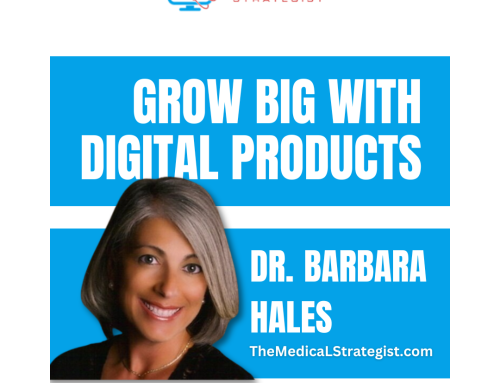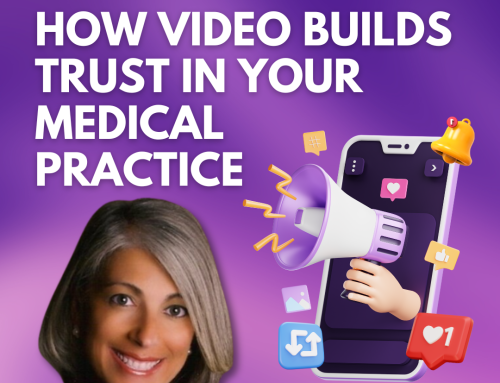Podcast: Play in new window | Download
Subscribe: RSS
In this episode, Dr. Barbara Hales discusses:
- The value of guest podcasting for health professionals to expand their reach and build patient trust.
- How guest podcasting can enhance credibility, patient engagement, and search engine ranking.
- Key strategies to maximize impact as a podcast guest, from preparation to post-episode promotion.
Key Takeaways: “Guest podcasting offers a low-risk, high-reward opportunity for health professionals to build visibility and credibility without the ongoing time and cost of hosting a show.”
Connect with Barbara Hales:
Twitter: @DrBarbaraHales
Facebook: facebook.com/theMedicalStrategist
Business website: www.TheMedicalStrategist.com
Show website: www.MarketingTipsForDoctors.com
Email: info@TheMedicalStrategist.com
YouTube: TheMedicalStrategist
LinkedIn: www.linkedin.com/in/barbarahalesmd
Books:
Content Copy Made Easy
14 Tactics to Triple Sales
Power to the Patient: The Medical Strategist
TRANSCRIPTION (177)
Introduction to Guest Podcasting
Dr. Barbara Hales: Welcome to another episode of Marketing Tips for Doctors. I’m your host, Dr. Barbara Hales. Today, we’re going to be talking about a powerful, yet underutilized way for health professionals to expand their reach, attract more patients, and establish trust within the community: guest podcasting. In case you haven’t guessed, whether you’re already familiar with podcasting or just dipping your toes into the idea, I’ll break down why being a guest on someone else’s podcast can be a valuable tool in your marketing strategy. I’ll also give you some actionable steps to make the most out of each guest appearance.
Why Guest Podcasting?
Dr. Barbara Hales: Podcasting, as you know, is a growing medium. Health podcasts in particular have seen a significant increase in listenership over the last few years. This rise means there’s a tremendous opportunity to reach a relevant audience, whether that’s potential patients, colleagues, or even referring physicians.
Dr. Barbara Hales: As a guest on someone else’s podcast, you have access to their established audience, which can help you introduce yourself to people who otherwise might never hear of you or your practice. Podcast listeners are often highly engaged, trust the host they listen to, and value the information shared. When you appear on a reputable podcast, the audience associates you with the trusted host, which builds credibility. You’re entering listeners’ space in an unobtrusive, personal way, which can deepen patient trust and create a connection that’s harder to achieve through written content alone. Hearing someone speak can make a profound impact on potential patients or colleagues by providing a sense of who you are beyond the clinical setting.
Dr. Barbara Hales: When you guest on a podcast, it often includes a mention on their website, sometimes with a link to your practice or social media profile, which can improve your search engine ranking, making it easier for new patients to find you online. Podcasting also allows you to showcase your specialty. You can communicate nuances and specifics about your area of expertise that might not come across in written content, answer common questions, address concerns, and provide reassurance that’s specific to your practice area.
Dr. Barbara Hales: Your guest appearance isn’t a one-time event. Once the episode is live, you can share it on your own channels, including your website, email newsletters, and social media, to reinforce your expertise and give your own audience valuable information. It’s all about setting yourself up for success.
Maximizing Your Guest Appearance
Dr. Barbara Hales: Preparation is key to making the most of each guest appearance. Look for podcasts that align with your specialty and audience. For example, if you’re a woman’s health specialist, find podcasts that speak to that community. It’s also helpful to consider podcasts that may address overlapping interests, such as general wellness, family health, or preventive medicine.
Dr. Barbara Hales: When contacting a podcast host, make it clear why you’re interested in their show specifically. Explain what you bring to the table and how your message aligns with their audience. A thoughtful, personalized pitch can go a long way. Take time to develop your core message. What’s the main takeaway you want the audience to remember? Are there key points you want to emphasize? This preparation helps you stay focused and ensures that you maximize your impact during the interview.
Dr. Barbara Hales: Stories and examples make content memorable. Think of real patient scenarios, keeping confidentiality in mind, of course. Success stories or personal anecdotes that illustrate your points can help create a connection. Audiences connect with stories more than raw information. Podcasts are conversational, but practice can help ensure you’re clear, concise, and engaging. Speak slowly, enunciate, and use a friendly, open tone. If you’re nervous, try practicing with a colleague or recording yourself to get comfortable with how you sound.
Dr. Barbara Hales: Once you’re on the podcast, remember you’re speaking to people interested in health topics who trust the host. Approach the conversation with authenticity and a willingness to connect. Don’t just deliver a lecture; respond to questions with a curious, conversational tone. Identify two to three main takeaways you want the audience to remember. It’s tempting to share a lot, but people remember fewer points when there’s too much information. Keep it focused.
Dr. Barbara Hales: At the end of the podcast, briefly mention where listeners can learn more, whether it’s your website, a free resource you offer, or your social media profile. A clear call to action can guide interested listeners to continue engaging with you. Express your gratitude to the host for inviting you, as this builds a positive relationship, which can lead to future collaborations or referrals. It also shows listeners that you respect and appreciate their trusted host.
Dr. Barbara Hales: When your episode airs, the marketing doesn’t stop there. Share the episode on your website, social media, and with your email list. Highlight a few key quotes or topics covered to pique interest, letting your own audience know about your appearance, which strengthens your reputation and amplifies the podcast’s reach. A short thank-you email to the host goes a long way. Express your appreciation and suggest ways to stay connected, such as future collaborations or cross-promotion. Pay attention to any increase in website traffic, new followers, or patient inquiries as this helps gauge the impact of your appearance and informs your strategy for future guest appearances.
Guest Podcasting vs. Hosting Your Own Podcast
Dr. Barbara Hales: Now, let’s review the advantages of guest podcasting over hosting your own podcast. Many of you may be thinking, “Well, instead of just being a guest, how about if I had my own podcast? Wouldn’t that spread my name and show my authority more?” That’s a good question. Guest podcasting is an excellent way to enjoy the benefits of podcast exposure without the commitment and workload of running your own show. In medicine, we have enough time commitments as it is, without worrying about yet another obligation.
Dr. Barbara Hales: Appearing as a guest on another podcast requires minimal preparation compared to producing your own show. You only need to focus on the content and message for one episode rather than regular uploads, episode planning, guest scheduling, editing, and publishing. Running a podcast is a significant time investment. For a regular show, you’d need to consistently brainstorm topics, manage a production schedule, record, edit, and promote every episode, which can be demanding for busy health professionals.
Dr. Barbara Hales: As a guest, you’re tapping into a podcast that already has a dedicated listener base. You benefit from their established audience without needing to build one from scratch, allowing you to reach new listeners who may already trust and engage with the podcast. Starting your own podcast means you need to invest significant time and effort to grow an audience, which can take months, even years, to reach the level of exposure that an established podcast already has.
Dr. Barbara Hales: When you appear as a guest, you are benefiting from the trust and credibility the host has built with their audience. The host is vouching for you, so listeners are more likely to trust your insights. Building your own audience’s trust takes time and consistency. Establishing authority requires continuous effort, especially since listeners don’t have a reason to follow or trust you from the start.
Dr. Barbara Hales: As a guest, there are typically no costs associated with appearing on someone else’s podcast. All you need is a good microphone and internet connection. Running a podcast involves expenses for equipment, software, possibly hiring editors and designers, and paying for hosting services. The costs can add up quickly, especially if you aim for high production quality.
Dr. Barbara Hales: You also have the freedom to appear on multiple podcasts, giving you a variety of exposure across different audiences. You can explore different topics and showcase your expertise without being tied to a single niche. Hosting your own show means committing to a regular upload schedule, which can be hard to maintain, especially if your main job is demanding. Podcast listeners expect consistency, and maintaining a regular schedule is key to building an audience. For a health professional with limited time, consistently delivering new episodes can become a challenge, which might impact audience retention.
Dr. Barbara Hales: When you guest on a podcast, you can tailor each appearance to a specific topic or message, ensuring you make the most impact on each show. You can share unique stories and perspectives, offering value without needing to create a full series to keep listeners engaged. Each appearance gives you a chance to connect with new hosts and potentially their network of listeners and professionals. It can open doors to further collaborations and partnerships without the administrative responsibilities of managing a show.
Dr. Barbara Hales: In conclusion, guest podcasting offers a low-risk, high-reward opportunity for health professionals to build visibility, credibility, and reach without the extensive time, cost, and commitment required to host their own podcast. By strategically appearing on established shows, you can amplify your message, reach new audiences, and build trust with minimal ongoing demands, making it an ideal approach for busy professionals.
Dr. Barbara Hales: If talking about guest podcasting has piqued your interest, I’d like to offer you this opportunity. You can be a guest on my podcast so that we can showcase what you do, your medical practice, your expertise, and anything else that you would like to share with our audience. Visit The Medical Strategist to snag your episode. I look forward to connecting with you.



